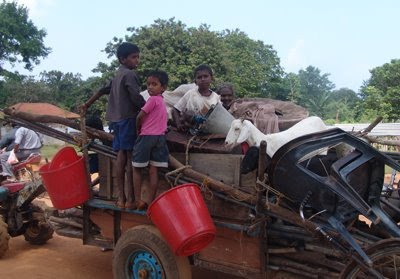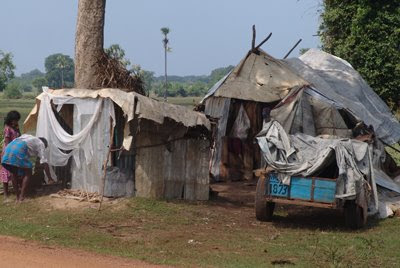America's Crimes "Never Happened"
by Paul Craig Roberts
(January 01, Washington, Sri Lanka Guardian) The title of my article comes from the sermon of the Episcopal Bishop of Washington DC, John Bryson Chane, delivered on October 5, 2008, at St. Columba Church. The bishop’s eyes were opened to Israel’s persecution of Palestinians by his recent trip to Palestine. In his sermon he called on “politicians seeking the highest office in [our] land” to find the courage to “speak out and condemn violations of human rights and religious freedom denied to Palestinian Christians and Muslims” by the state of Israel.
Bishop Chane’s courage was to no avail. When America’s new leader of “change” was informed of Israel’s massive air attack on the Gaza Ghetto, an area of 139 square miles where Israel confines 1.4 million Arabs and tightly controls the inflow of all resources--food, medicine, water, energy--America’s president-elect Obama had “no comment.”
According to the Jerusalem Post ( December 26), “at 11:30 a.m., more than 50 fighter jets and attack helicopters swept into Gazan airspace and dropped more than 100 bombs on 50 targets. . . . Thirty minutes later, a second wave of 60 jets and helicopters struck at 60 targets . . . More than 170 targets were hit by IAF aircraft throughout the day. At least 230 Gazans were killed and over 780 were wounded . . .”
As I write, news reports are that Israel is sending tanks and infantry reinforcements in preparation for a ground invasion of Gaza.
Israel’s excuse for its violence is that from time to time the Palestinian resistance organization, Hamas, fires off rockets into Israel to protest the ghetto life that Israel imposes on Gazans. The rockets are ineffectual for the most part and seldom claim Israeli casualties. However, the real purpose for the Israeli attack is to destroy Hamas.
In 2006 the US insisted that the Palestinians in Gaza and the West Bank hold free elections. When free elections were held, Hamas won. This was unacceptable to the Americans and Israelis. In the West Bank, the Americans and Israelis imposed a puppet government, but Hamas held on in Gaza. After unheeded warnings to the Gazans to rid themselves of Hamas and accept a puppet government, Israel has decided to destroy the freely elected government with violence.
Ehud Barak, who is overseeing the latest act of Israeli aggression, said in interviews addressed to the British and American publics that asking Israel to agree to a ceasefire with Hamas would be like asking the US to agree to a ceasefire with al Qaeda. The terrorism that Israel inflicts on Palestinians goes unremarked.
According to the London Times (December 28), “Britain and the United States were on a collision course with their European allies last night after refusing to call for an end to Israeli airstrikes on Hamas targets in Gaza. The wave of attacks marked a violent end to President George W. Bush’s sporadic Middle East peace efforts. The White House put the blame squarely on Hamas.” The British government also blamed Hamas.
For the US and UK governments, Israel can do no wrong. Israel doesn’t have to stop withholding food, medicine, water, and energy, but Hamas must stop protesting by firing off rockets. In violation of international law, Israel can drive West Bank Palestinians off their lands and out of their villages and give the stolen properties to “settlers.” Israel can delay Palestinians in need of emergency medical care at checkpoints until their lives ebb away. Israeli snipers can get their jollies murdering Palestinian children.
The Great Moral Anglo-Americans couldn’t care less.
In his 2005 Nobel Lecture, British playwright Harold Pinter held the United States and its British puppet state accountable for “the systematic brutality, the widespread atrocities, the ruthless suppression of independent thought.” Everyone knows that such crimes occurred in the Soviet Union and in its East European empire, but “US crimes in the same period have only been superficially recorded, let alone documented, let alone acknowledged, let alone recognized as crimes at all,” this despite the fact that “the United States’ actions throughout the world made it clear that it had concluded it had carte blanche to do what it liked.”
Soviet crimes, like Nazi ones, are documented in gruesome detail, but America’s crimes “never happened. Nothing ever happened. Even while it was happening it wasn’t happening. It didn’t matter. It was of no interest. The crimes of the United States have been systematic, constant, vicious, remorseless, but very few people have actually talked about them You have to hand it to America. It has exercised a clinical manipulation of power worldwide while masquerading as a force for universal good. It’s a brilliant, even witty, highly successful act of hypnosis.”
America’s is “a scintillating stratagem. Language is actually employed to keep thought at bay. The words ‘the American people’ provide a truly voluptuous cushion of reassurance. You don’t need to think.”
Pinter presents a long list of American crimes and comes to Iraq: “The invasion of Iraq was a bandit act, an act of blatant state terrorism, demonstrating absolute contempt for the concept of international law. The invasion was . . . an act intended to consolidate American military and economic control of the Middle East masquerading--as a last resort--all other justifications having failed to justify themselves--as liberation.” Americans and their British puppets “have brought torture, cluster bombs, depleted uranium, innumerable acts of random murder, misery, degradation and death to the Iraqi people and call it ‘bringing freedom and democracy to the Middle East.”
“How many people do you have to kill before you qualify to be described as a mass murderer and a war criminal?” Pinter’s question can also be asked of Israel. Israel has been in violation of international law since 1967, protected by the United States’ veto of UN Resolutions condemning Israel for its violent, inhumane, barbaric, and illegal acts.
American evangelical Christians, who are degenerating into Zionists, are Israel’s greatest allies. Jesus is forsaken as Christians swallow whole the Israeli lies. A couple of years ago the US Presbyterian Church was so distressed by Israel’s immorality toward Palestinians that the church attempted to disinvest its investment portfolio from assets tainted with Israel. But the Israel Lobby was stronger. The Presbyterian Church was unable to stand up for Christian principles and knuckled under to the Israel Lobby’s pressure.
This is hardly surprising considering that the US government doesn’t stand for Christian principles either.
America’s doctrine of “full spectrum dominance” means that, like Lenin’s dictatorship, America is not bound by law or morality, but by power alone.
Pinter sums it up in a speech he had dreams of writing for President George W. Bush:
“God is good. God is great. God is good. My God is good. Bin Laden’s God is bad. His is a bad God. Saddam’s God was bad, except he didn’t have one. He was a barbarian. We are not barbarians. We don’t chop people’s heads off. We believe in freedom. So does God. I am not a barbarian. I am the democratically elected leader of a freedom-loving democracy. We are a compassionate society. We give compassionate electrocution and compassionate lethal injection. We are a great nation. I am not a dictator. He is. I am not a barbarian. He is. And he is. They all are. I possess moral authority. You see this fist? This is my moral authority. And don’t you forget it.”
If only our ears could hear, this is the speech we have been hearing from Israel for 60 years.
Paul Craig Roberts was Assistant Secretary of the Treasury in the Reagan administration. He is coauthor of The Tyranny of Good Intentions.He can be reached at: PaulCraigRoberts@yahoo.com - Sri Lanka Guardian



















